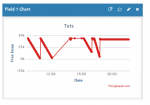Приветствую.
Есть пример кода с Thingspeak - накапливает данные каждые 15 сек и затем передает каждые 2 минуты на сервер. Но с каждой передачей уменьшается freeheap и в конце зависает ESP8266.
Как побороть эту проблему?
Оригинал кода здесь. Я изменил только вывод данных.
Мой код:
Есть пример кода с Thingspeak - накапливает данные каждые 15 сек и затем передает каждые 2 минуты на сервер. Но с каждой передачей уменьшается freeheap и в конце зависает ESP8266.
Как побороть эту проблему?
Оригинал кода здесь. Я изменил только вывод данных.
Мой код:
Код:
/* This example shows how to bulk update a ThingSpeak channel using an Arduino MKR1000 or an ESP8266*/
#include<EthernetClient.h> //Uncomment this library to work with ESP8266
#include<ESP8266WiFi.h> //Uncomment this library to work with ESP8266
//#include<SPI.h> // Comment this to work with ESP8266 board
//#include<WiFi101.h> // Comment this to work with ESP8266 board
char jsonBuffer[500] = "["; // Initialize the jsonBuffer to hold data
char ssid[] = "XXXXXXXXXXXXX"; // Your network SSID (name)
char pass[] = "XXXXXXXXXXXX"; // Your network password
WiFiClient client; // Initialize the WiFi client library
char server[] = "api.thingspeak.com"; // ThingSpeak Server
/* Collect data once every 15 seconds and post data to ThingSpeak channel once every 2 minutes */
unsigned long lastConnectionTime = 0; // Track the last connection time
unsigned long lastUpdateTime = 0; // Track the last update time
const unsigned long postingInterval = 120L * 1000L; // Post data every 2 minutes
const unsigned long updateInterval = 15L * 1000L; // Update once every 15 seconds
void setup() {
Serial.begin(9600);
// Attempt to connect to WiFi network
while (WiFi.status() != WL_CONNECTED) {
Serial.print("Attempting to connect to SSID: ");
Serial.println(ssid);
WiFi.begin(ssid, pass); // Connect to WPA/WPA2 network. Change this line if using open or WEP network
delay(10000); // Wait 10 seconds to connect
}
Serial.println("Connected to wifi");
printWiFiStatus(); // Print WiFi connection information
}
void loop() {
// If update time has reached 15 seconds, then update the jsonBuffer
if (millis() - lastUpdateTime >= updateInterval) {
updatesJson(jsonBuffer);
Serial.println(jsonBuffer);
Serial.println(sizeof(jsonBuffer));
}
}
// Updates the jsonBuffer with data
void updatesJson(char* jsonBuffer){
/* JSON format for updates paramter in the API
* This example uses the relative timestamp as it uses the "delta_t". If your device has a real-time clock, you can provide the absolute timestamp using the "created_at" parameter
* instead of "delta_t".
* "[{\"delta_t\":0,\"field1\":-70},{\"delta_t\":15,\"field1\":-66}]"
*/
// Format the jsonBuffer as noted above
strcat(jsonBuffer,"{\"delta_t\":");
unsigned long deltaT = (millis() - lastUpdateTime)/1000;
size_t lengthT = String(deltaT).length();
char temp[4];
String(deltaT).toCharArray(temp,lengthT+1);
strcat(jsonBuffer,temp);
strcat(jsonBuffer,",");
//long rssi = WiFi.RSSI();
long freeheap = ESP.getFreeHeap();
strcat(jsonBuffer, "\"field1\":");
//lengthT = String(rssi).length();
lengthT = String(freeheap).length();
//String(rssi).toCharArray(temp,lengthT+1);
String(freeheap).toCharArray(temp,lengthT+1);
strcat(jsonBuffer,temp);
// strcat(jsonBuffer,",");
// long freeheap = ESP.getFreeHeap();
// strcat(jsonBuffer, "\"field2\":");
// lengthT = String(freeheap).length();
// String(freeheap).toCharArray(temp,lengthT+1);
// strcat(jsonBuffer,temp);
strcat(jsonBuffer,"},");
// If posting interval time has reached 2 minutes, then update the ThingSpeak channel with your data
if (millis() - lastConnectionTime >= postingInterval) {
size_t len = strlen(jsonBuffer);
jsonBuffer[len-1] = ']';
httpRequest(jsonBuffer);
}
lastUpdateTime = millis(); // Update the last update time
Serial.println(sizeof(temp));
}
// Updates the ThingSpeakchannel with data
void httpRequest(char* jsonBuffer) {
/* JSON format for data buffer in the API
* This example uses the relative timestamp as it uses the "delta_t". If your device has a real-time clock, you can also provide the absolute timestamp using the "created_at" parameter
* instead of "delta_t".
* "{\"write_api_key\":\"YOUR-CHANNEL-WRITEAPIKEY\",\"updates\":[{\"delta_t\":0,\"field1\":-60},{\"delta_t\":15,\"field1\":200},{\"delta_t\":15,\"field1\":-66}]
*/
// Format the data buffer as noted above
char data[500] = "{\"write_api_key\":\"XXXXXXXXXX\",\"updates\":"; //Replace YOUR-CHANNEL-WRITEAPIKEY with your ThingSpeak channel write API key
strcat(data,jsonBuffer);
strcat(data,"}");
// Close any connection before sending a new request
client.stop();
String data_length = String(strlen(data)+1); //Compute the data buffer length
// POST data to ThingSpeak
if (client.connect(server, 80)) {
client.println("POST /channels/XXXXXX/bulk_update.json HTTP/1.1"); //Replace YOUR-CHANNEL-ID with your ThingSpeak channel ID
client.println("Host: api.thingspeak.com");
client.println("User-Agent: mw.doc.bulk-update (Arduino ESP8266)");
client.println("Connection: close");
client.println("Content-Type: application/json");
client.println("Content-Length: "+data_length);
client.println();
client.println(data);
}
// else {
// Serial.println("Failure: Failed to connect to ThingSpeak");
// }
delay(250); //Wait to receive the response
client.parseFloat();
String resp = String(client.parseInt());
Serial.println("Response code:"+resp); // Print the response code. 202 indicates that the server has accepted the response
jsonBuffer[0] = '['; // Reinitialize the jsonBuffer for next batch of data
jsonBuffer[1] = '\0';
lastConnectionTime = millis(); // Update the last connection time
}
void printWiFiStatus() {
// Print the SSID of the network you're attached to:
Serial.print("SSID: ");
Serial.println(WiFi.SSID());
// Print your device IP address:
IPAddress ip = WiFi.localIP();
Serial.print("IP Address: ");
Serial.println(ip);
// Print the received signal strength:
long rssi = WiFi.RSSI();
Serial.print("signal strength (RSSI):");
Serial.print(rssi);
Serial.println(" dBm");
}

